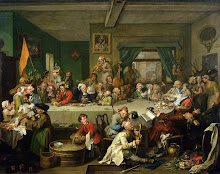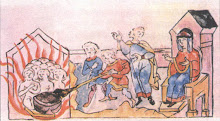“Web surfers see facts as a bore,Poe has acquired quite the afterlife online. Unfortunately, it has usually turned out to be in Bizarroville. I have grown accustomed to finding deranged biographical fictions about the man on certain websites that are, like Hastur, Not to Be Named. However, it is a new twist to the generally hellish existence of a Poe blogger to discover that there is a positive mania for attributing the words of others to Poe. The fact that said quotes are inevitably mind-bendingly stupid only adds to the horror.
‘Check sources?’ they say, ‘Nevermore!’
No matter how often he’s given the credit,
Don’t take it for granted that Edgar Poe said it.”
-Geoffrey Chaucer
The following are lines that the Interwebs have attributed to Poe--often at literally thousands of different sites. Read ‘em and weep, gang:
1. “Sleep, those little slices of death-- how I loathe them.”
This is one of those quotes that gets attributed to virtually everyone who has ever picked up a pen, but Poe seems to get saddled with it the most. One source claims it traces back to a line from the 1959 film “Journey to the Center of the Earth.” (“I don’t sleep. I hate those little slices of death.") In any case, whoever wrote it, it wasn’t Poe.
2. “All religion, my friend, is simply evolved out of fraud, fear, greed, imagination, and poetry.”
I covered this one before, but its lure is still evidently irresistible for everyone with a fondness for theology on the cheap.
3. “Science has not yet taught us if madness is or is not the sublimity of the intelligence.”
Here we have a bastardization of the famous line from “Eleonora”: “Men have called me mad; but the question is not yet settled, whether madness is or is not the loftiest intelligence…”
4. “Sometimes I’m terrified of my heart; of its constant hunger for whatever it is it wants. The way it stops and starts."
Wrong Poe, kids. This line is from a song by the living singer-songwriter Poe, (“Terrified Heart”) rather than the not-so-living author.
5. “The best things in life make you sweaty.”
You know, I could really use a martini right about now.
6. “The past is a pebble in my shoe.”
The singer/songwriter Poe is a thorn in my side.
7. “To elevate the soul, poetry is necessary.”
I suspect this is another case of someone repeating words of Poe’s they vaguely remember without bothering to recheck their sources. It reads like a mashup of a line from Poe’s 1846 review of William Cullen Bryant, (“Poetry, in elevating, tranquilizes the soul,”) with “The Poetic Principle’s” “a poem deserves its title only inasmuch as it excites, by elevating the soul.” This is not a literal Poe quote, however.
8. “Stupidity is a talent for misconceptions.”
Here at last we’re seeing glimmerings of authentic Poe. In “The Rationale of Verse,” he wrote, “On account of the stupidity of some people, or, (if talent be a more respectable word,) on account of their talent for misconception…”
9. “If you run out of ideas follow the road; you'll get there.”
Bet you didn’t know Poe was a TED speaker in his off-hours, did you?
Thank God for gin.
10. “A woman being never at a loss... the devil always sticks by them.”
This is a genuine quote, but not by Poe. It’s from a letter written by Lord Byron. But hey, who can tell all those dead poets apart, right?
11. “The ninety and nine are with dreams, content, but the hope of the world made new, is the hundredth man who is grimly bent on making those dreams come true.”
This dates from about the 1920s. It's from a poem called “Dreamer and Doer,” written by Ted Olsen. Perhaps the gods know how it came to be associated with Poe, but I sure don’t.
12. “The idea of God, infinity, or spirit stands for the possible attempt at an impossible conception.”
This sentence--which, like #2 above, is often used to prove Poe’s “atheism”--is a misleading paraphrase of a passage from “Eureka”: “Let us begin, then, at once, with that merest of words, ‘Infinity.’ This, like ‘God,’ ‘spirit,’ and some other expressions of which the equivalents exist in all languages, is by no means the expression of an idea, but of an effort at one. It stands for the possible attempt at an impossible conception.”
13. “No one should brave the underworld alone.”
The least this woman can do is give Edgar a share of her royalties.
14. “The pioneers and missionaries of religion have been the real cause of more trouble and war than all other classes of mankind.”
This is another statement put in Poe’s mouth from that lunatic John Alexander Joyce book that spawned quote #2. No one who has any real knowledge of Poe and his work could possibly believe this quote is genuine, but it has caused no end of false assumptions among everyone else.
15. “A million candles have burned themselves out. Still I read on.”
That is supposedly from “The Cask of Amontillado.” (Sometimes, it's simply attributed to "Montresor.") All I can say is, this line is not in the story, or anything Poe or anyone else ever wrote as far as I can tell. This one’s a puzzler.
16. “Lives of great men all remind us
We can make our lives sublime,
And, departing, leave behind us
Footprints on the sands of time.”
I am trying, and utterly failing, to picture what Poe’s reaction would be if he knew that long after his death, the Internet would make him plagiarize Longfellow.
17. “I do not suffer from insanity, I enjoy every minute of it.”
Good for you, buddy. That's more than I can say right now.
And don’t you notice my glass is empty? Pour another, quick.
18. “Come little children
I'll take thee away, into a land of Enchantment
Come little children the time's come to play
Here in my garden of Shadows
Follow sweet children I'll show thee the way
Through all the pain and the Sorrows
Weep not poor children
For life is this way murdering beauty and Passions
Hush now dear children it must be this way
To weary of life and Deceptions
Rest now my children for soon we'll away
Into the calm and the Quiet
Come little children
I'll take thee away, into a land of Enchantment
Come little children the time's come to play
Here in my garden of Shadows”
No, this song comes from a 1993 movie, “Hocus Pocus.” Yes, there are loads of people out there who think Poe was driveling idiot enough to write it. If this list doesn’t turn me into a falling-down drunk, nothing will.
19. “There is no exquisite beauty… without some strangeness in the proportion.”
You get half-credit for this one. Poe did use this line several times, most notably in "Ligeia." However, if you would bother to actually read Poe instead of fishing the Internet for cutesy quotes to post on Tumblr, you would realize that he was quoting Francis Bacon, not providing original words of his own.
20. "I wish I could write as mysterious as a cat."
I don't have the slightest idea in Hell where this ungrammatical little quip originated. And a Google search for the line returned 177,000 hits. Sigh.
21. “I remained too much inside my head and ended up losing my mind.”
Stop it. Just, please...stop it.
22. "If a poem hasn’t ripped apart your soul, you haven’t experienced poetry.”
If a bogus Edgar Allan Poe quote hasn't ripped apart your soul, you haven't experienced the internet.
23. "The scariest monsters are the ones that lurk within our souls."
The scariest bogus quotes are the ones that lurk within the internet. This line was a tweet by someone with the Twitter handle "Edgar_Allan_Poe," but it has nothing to do with the real Edgar.
Well, there you go. I’m sure there are more soul-ripping pseudo-Poe quotations out there, but these are all I’ve encountered to date. If you know of some I’ve missed, or if I’ve accidentally made some errors of attribution myself, I’d appreciate hearing about it.
In the meantime, remember: Friends don’t let friends misquote Poe.
[Update: The Poe Museum blog has a few more. The quotes just keep on comin'!]


















